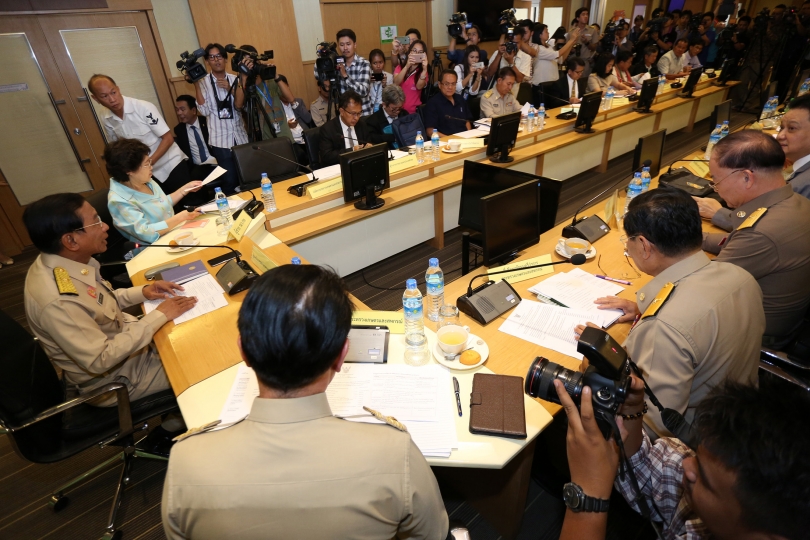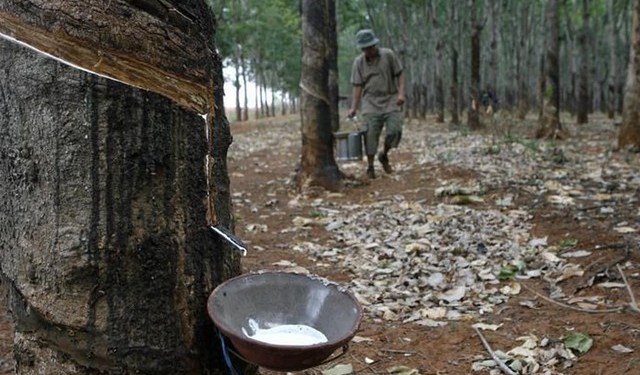PRIME MINISTER Prayut Chan-o-cha yesterday slammed Suthep Thaugsuban, chairman of People’s Democratic Reform Foundation, for calling for a state subsidy to boost the price of natural rubber from Bt33-34 up to Bt60 per kilogram.
He also asked Suthep where the government would get the money to fund that subsidy.

Prayut rejects call for govt to intervene in market, vows to use more rubber in roads
Suthep yesterday called on |Prayut to invoke absolute power under the interim charter’s Article 44 and take quick action on sub-sidising farmers over the falling |price of rubber. He also suggested that the government set a purchase price and determine what products can be produced using natural rubber.
However, Prayut rejected Suthep’s suggestions, saying the government had decided to look for other measures to help rubber farmers.
The premier said Thailand now had 4.1 million tonnes of natural rubber, of which some 1.4 million tonnes were meant for domestic use and the remainder set aside for export. So, he asked where the country would find the money if it was to subsidise the farmers.
The premier went on to say that blaming the government for the state of the economy was not fair, as it has been working hard to drive the economy.
“I’m solving issues and coming up with measures to cushion potential risks in the future, be it in relation to rice or rubber,” he said.
He added that the government has come up with a procedure under which it will buy rubber from farmers at a price slightly higher than the market price. This rubber is then supplied to small-and-medium enterprises so they can use it as an ingredient for road construction material.
“I don’t want to say it is not value for money. Let people be the judge,” the premier said.
Prayut added that the government has already used 5 per cent of the rubber in material used in 37 roads and is considering the use up to 10 per cent in the future.
“However, we should come up with new products made of rubber, apart from just rubber latex, for the export market,” Prayut said. adding that the government purchase price might come out this week.
Suthep, meanwhile, warned farmers not to expect too much as all proposals were coming during a slowdown in the economy. However, he said, farmers could ponder whether they should protest against the government on the falling price of rubber.
“I believe that the government already heard what the rubber farmers want,” Suthep said, adding that he has already offered measures to deal with the falling rubber prices to Deputy Prime Minister Somkid Jatusripitak.
When asked if he would lead the protest if there was one, Suthep said he was not sure.
Separately, 50 leaders of rubber farmers in Surat Thani were yesterday summoned for attitude adjustment, as one of the leaders planned to submit a letter to Muang Trang Police Station for permission to hold a meeting today to resolve the low price problem. Leaders of rubber farmers’ networks from at least 10 provinces in the South will attend the meeting.
The network leaders insisted that this was not a protest or related to politics.
Rubber farmers have been calling on the government to take several measures, including setting the purchase price at Bt60 per kilogram, announce that 360,000 tonnes of rubber in the state’s stock is “dead stock” and exercise absolute power to boost domestic consumption of rubber.
Education Minister General Dapong Ratanasuwan said yesterday up to 30,000 schools require rubber for the construction of sports fields, adding that the investment should be about Bt500 million.
Under the government’s plan to resolve the falling price of rubber, Commerce Minister Apiradi Tantraporn said her ministry would invite rubber importers from different countries, including Russia, to meet rubber traders in Thailand to encourage exports.
She said that once rubber |traders are able to match buyers’ demands, Thailand should be able to release rubber stocks and drive up the price.
Despite the falling price of rubber, it is still Thailand’s biggest agricultural export product, with shipment volumes reaching 3.33 million tonnes or worth US$4.68 billion in the first 11 months last year. Rubber accounts for 2.4 per cent o f the country’s total shipment value.
In 2014, 3.4 million tonnes of |rubber worth $6.02 billion were exported.




























